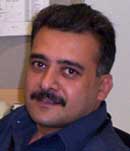Expect a major shake-up in TV content
Ranjit Hira
10 June 2003
 Mumbai: The conditional access system, or CAS, for television viewers to be implemented in India after 14 July 2003 is embroiled in controversy. Since it will have a tremendous impact on the media and advertising industry, domain-b interviewed Sanjoy Chakrabarty, director (investments), WPP Marketing Communications India Pvt Ltd, to understand the media buyer's viewpoint.
Mumbai: The conditional access system, or CAS, for television viewers to be implemented in India after 14 July 2003 is embroiled in controversy. Since it will have a tremendous impact on the media and advertising industry, domain-b interviewed Sanjoy Chakrabarty, director (investments), WPP Marketing Communications India Pvt Ltd, to understand the media buyer's viewpoint.
Chakrabarty, who was earlier media director at Hindustan Thompson Associates, looks after the buying requirements of all WPP clients (MindShare and Maximize) excluding MindShare Fulcrum, which manages the Hindustan Lever portfolio.
WPP Marketing Communications is today the world's second-largest media and marketing organisation and the largest such entity in India. Founded in 1998, with the merger of the media operations of JWT and O&M, WPP operates under the MindShare brand, which is part of a network of over 60 global communication companies incorporating expertise from the WPP group companies together with the MindShare specialist units. These are MindShare Digital, MindShare Direct, MindShare Consumer Insight, Maximise, the Advanced Techniques group, BroadMind, and the WOW factory.
Worldwide WPPMC's clients include American Express, De Beers, Ford, IBM, Kellogg, Kimberly-Clark, Kraft, Nestlé, Pepsi, Rolex, Shell, Sony, Unilever and Warner Lambert. WPP's clients in India include HLL, ICICI, Pepsi, Kodak, Ford, Onida, Star TV, De Beers, Nestle and Electrolux, making it India's biggest media buyer with billings in excess of Rs 1,500 crore.
WPP aims to corner at least 30 per cent of the estimated Rs 7,000-crore media-buying market in India. Since its launch in India in 2002, WPP Media's different operating and specialist units have won almost 90 per cent of businesses pitched, numerous Emvie awards and also won the Unilever Worldwide Communication Channel Planning Gold.
